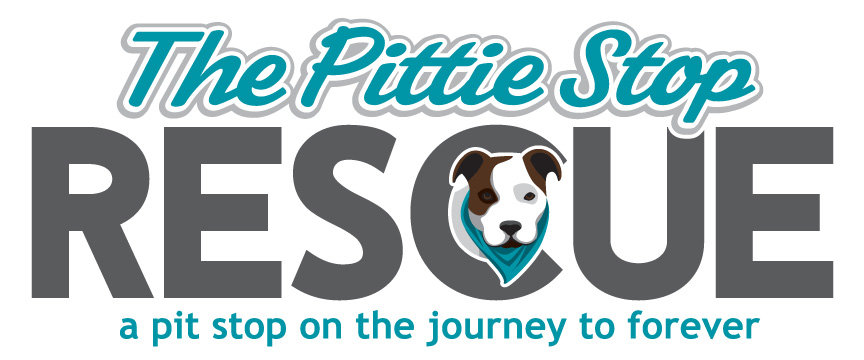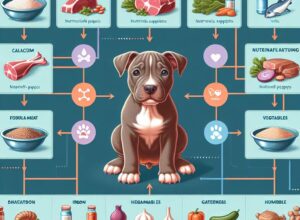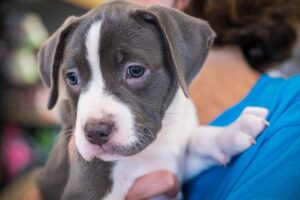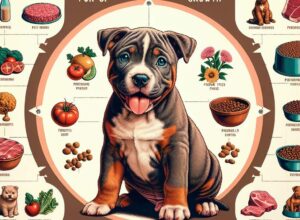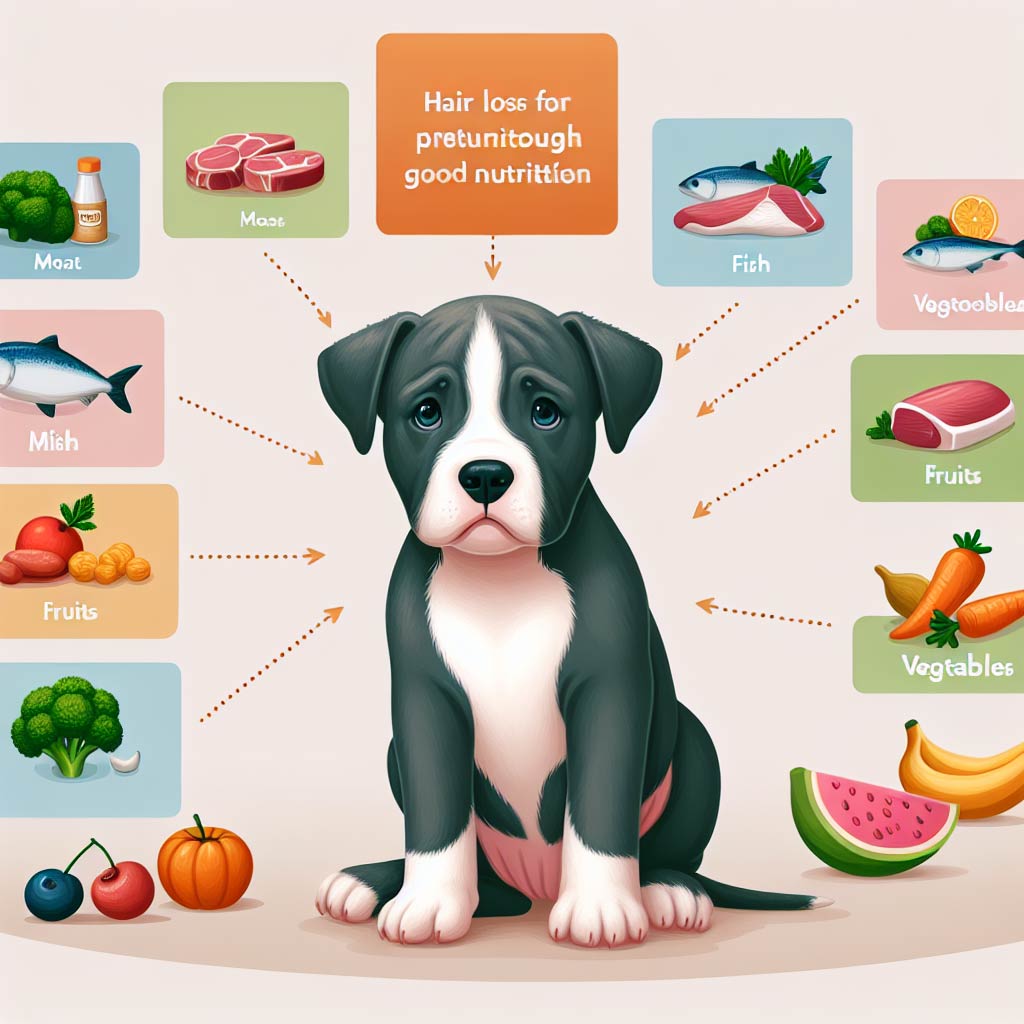
A Tail of Nutrition: Sustaining a Pitbull Puppy’s Lush Coat
Let’s face it, we all want our pitbull puppies to have that show-stopping, shiny coat that turns heads at the dog park. But achieving that level of coat envy is more than just skin deep—it starts with what’s in their bowl. Nutrition is the cornerstone of a healthy coat, and I’m here to guide you through the essentials of feeding your pitbull puppy for optimal hair health.
Key Takeaways
- A balanced diet rich in high-quality proteins is crucial for a pitbull puppy’s coat health.
- Essential fatty acids, like Omega-3 and Omega-6, add that glossy sheen to your pup’s fur.
- Vitamins and minerals play a significant role in preventing hair loss and promoting growth.
- Hydration is often overlooked but is key to maintaining a healthy skin and coat.
- Avoiding common dietary pitfalls can prevent hair loss and ensure a vibrant coat.
Serving Up the Right Diet
What you feed your pitbull puppy has a direct impact on their coat’s health. A well-rounded diet that’s tailored to their unique needs is the first step. This means choosing a puppy food that’s designed for their life stage, breed size, and energy levels. But it’s not just about picking the right bag of kibble—fresh, whole foods can also be a game-changer for your pup’s coat.
High-Quality Proteins: Building Blocks for a Healthy Coat
Proteins are the building blocks of life, and that includes your pitbull puppy’s fur. A diet lacking in high-quality proteins can lead to a dull, lifeless coat, and even hair loss. But, load up their diet with the right proteins, and you’ll notice a thicker, more resilient coat. Here’s what to look for:
- Real meat as the first ingredient (chicken, beef, fish, etc.)
- Easily digestible proteins for puppies with sensitive stomachs
- A variety of protein sources to promote a balanced diet
- Avoid by-products and meat meals as they are inferior sources of protein
Fatty Acids: The Secret to a Glossy Sheen
Ever wonder how some dogs have coats that seem to glisten in the sun? The secret is in the fatty acids. Omega-3 and Omega-6 fatty acids are essential for a healthy coat and skin. They help reduce inflammation and keep your pitbull’s coat shiny and soft. Fish oil supplements can be a great source, but it’s best to consult with your vet to get the dosage right.
Vitamins and Minerals: Vital for Vigorous Fur Growth
Vitamins and minerals are the unsung heroes when it comes to your pitbull puppy’s coat. They support skin health and hair growth, making them essential for preventing hair loss. Here’s a quick rundown of what to include:
- Vitamin A for skin repair and maintenance
- B Vitamins for hair growth and color
- Zinc for repairing skin and strengthening hair
- Iron to prevent hair loss
- Biotin to thicken the coat
Remember, a balanced diet is key. Over-supplementing can be just as harmful as deficiencies, so always aim for a diet that provides these nutrients naturally, and supplement only when necessary and advised by your vet.
Proper Hydration: The Underrated Hero
Think of water as the most natural, inexpensive coat conditioner for your pitbull puppy. Hydration plays a pivotal role in maintaining healthy skin and a lustrous coat. Without enough water, your pup’s skin can become dry and flaky, leading to hair loss and itchiness. Ensure your pitbull has constant access to clean, fresh water, and you’ll be setting them up for coat success.
Chew on This: Avoiding Dietary Pitfalls
It’s not just about what you include in your pitbull puppy’s diet, but also what you avoid. Certain ingredients can do more harm than good, leading to poor coat health and even hair loss. Let’s nip these dietary no-nos in the bud to keep your pup’s coat as healthy as their playful spirit.
Identifying Food Allergens
Allergies can wreak havoc on your pitbull puppy’s skin and coat. Common culprits include beef, dairy, wheat, egg, chicken, lamb, soy, pork, rabbit, and fish. If you notice your pup itching, developing rashes, or losing hair, it might be time for an allergy test. Working with your vet, you can pinpoint the allergen and tailor their diet for relief.
Steering Clear of Fillers and Low-Quality Ingredients
Fillers like corn, wheat, and soy add little nutritional value and can even lead to digestive issues and coat problems. Similarly, low-quality ingredients and artificial additives can compromise your puppy’s overall health. Stick to high-quality, whole-food ingredients that nourish your pitbull from the inside out, promoting a coat that’s as robust as their bite.
Not Just Skin Deep: Beyond the Diet
A top-notch diet is fundamental for your pitbull puppy’s coat health, but it’s not the whole story. External care is just as important. A well-rounded approach to coat health includes grooming, exercise, and regular vet visits. Let’s brush up on these additional coat care strategies.
Grooming: A Smooth Path to Coat Health
Regular grooming is essential for a healthy coat. Brushing your pitbull puppy not only removes dead hair and skin but also stimulates blood flow to the hair follicles. This means a shinier coat and less hair on your couch. Use the right tools—a bristle brush or a rubber grooming mitt—and make grooming a bonding experience for you and your pup.
Exercise: The Catalyst for Circulation and Coat Care
Think of exercise as a tune-up for your pitbull puppy’s entire system, including their coat. Regular physical activity boosts circulation, which in turn ensures that vital nutrients reach the skin and fur, promoting a healthy, vibrant coat. Aim for daily walks, playtime, and age-appropriate exercise to keep your pup’s engine running smoothly and their coat glistening with health.
Parasite Prevention: Guarding the Coat from Invaders
Parasites like fleas, ticks, and mites aren’t just a nuisance—they can cause serious skin irritation and lead to hair loss. It’s crucial to stay on top of parasite prevention to protect your pitbull puppy’s coat and overall well-being. This means regular checks and preventative treatments that will keep these pesky critters at bay.
Regular Treatments: A Must-Do for Mite and Flea Prevention
To keep your pitbull puppy’s coat free from parasites, regular treatments are non-negotiable. Whether it’s a monthly topical application, a chewable pill, or a flea collar, staying consistent with these treatments is key. Always follow your vet’s recommendations and be proactive—don’t wait for an infestation to take action.
The Ultimate Checklist for a Flawless Fido Fur
Here’s a quick checklist to ensure your pitbull puppy’s coat remains as flawless as the day you brought them home:
- Feed a balanced diet rich in proteins, fatty acids, and essential nutrients.
- Keep your pup well-hydrated with access to fresh water at all times.
- Avoid ingredients that can cause allergies or have little nutritional value.
- Establish a regular grooming routine to keep their coat clean and tangle-free.
- Provide plenty of exercises to stimulate circulation and coat health.
- Stay vigilant with parasite prevention and treatment regimens.
- Schedule routine vet check-ups to catch any health issues early.
Routine Check-ups: The First Defense Against Hair Loss
Regular vet visits are crucial for catching any underlying health issues that could affect your pitbull puppy’s coat. From thyroid problems to hormonal imbalances, your vet can spot signs early and prescribe the necessary treatments. Consider these check-ups as your first line of defense against hair loss and coat troubles.
Seasonal Considerations: Adjusting Care as the Weather Changes
As the seasons change, so should your pitbull puppy’s coat care. In the winter, their skin can dry out, leading to a dull coat and increased shedding. Summer might bring allergies and an increased risk of parasites. Adjust your care routine accordingly—more moisturizing in the cold months and heightened allergy and flea vigilance in the warmer ones.
Specific Needs for Pitbull Puppies: Tailoring Their Regimen
Pitbull puppies are a unique bunch with specific nutritional needs that set them apart. These pups are known for their energy and rapid growth, which means they require more calories and nutrients than some other breeds. Protein is particularly important for muscle development, so look for foods that are high in animal-based proteins. Additionally, because pitbulls can be prone to skin issues, it’s essential to include foods rich in fatty acids to support their skin’s health. Tailoring their diet to meet these needs will help ensure your pitbull puppy grows up with a strong, healthy coat.
When to Seek Professional Help: Signs It’s More Than Just Shedding
While some hair loss is normal, excessive shedding or bald patches can be a sign of underlying health issues. If you notice your pitbull puppy is losing more hair than usual, or if the hair loss is accompanied by other symptoms like skin irritation, redness, or sores, it’s time to consult a vet. Other red flags include changes in behavior, such as excessive scratching, licking, or biting at their skin. These could be signs of allergies, parasites, or other health concerns that require professional attention.
FAQ: Nourishing Your Pitbull Puppy’s Coat
What is the best food to prevent hair loss in Pitbull puppies?
The best food for preventing hair loss in pitbull puppies is a high-quality, balanced diet that’s rich in animal proteins, essential fatty acids, and the right balance of vitamins and minerals. Look for puppy-specific formulas that cater to their growth needs and avoid foods with fillers or artificial additives. Incorporating fresh, whole foods like lean meats, fish, and vegetables can also provide the necessary nutrients for a healthy coat.
How often should I bathe my Pitbull puppy to maintain their coat?
Bathing your pitbull puppy too often can strip their coat of natural oils, leading to dry skin and potential hair loss. As a general rule, bathe your puppy every 2-3 months or when they’re visibly dirty or smelly. Use a gentle, puppy-specific shampoo and always follow up with a conditioner to keep their coat soft and hydrated. Between baths, regular brushing will help distribute natural oils and keep their coat clean.
Can supplements help prevent hair loss in Pitbull puppies?
Supplements can be beneficial in preventing hair loss, especially if your pitbull puppy’s diet is lacking in certain nutrients. Omega-3 and Omega-6 supplements, as well as those containing biotin, zinc, and vitamins A and E, can support skin and coat health. However, it’s crucial to consult with your vet before adding any supplements to your puppy’s diet to ensure they’re necessary and given in the correct dosage.
What should I do if my Pitbull puppy’s hair loss persists?
If you’ve followed all the right steps—providing a balanced diet, grooming regularly, and keeping up with parasite prevention—and your pitbull puppy’s hair loss continues, it’s time for a vet visit. Persistent hair loss can be a symptom of underlying health issues that require professional diagnosis and treatment. Your vet may perform skin scrapings, blood tests, or allergy testing to get to the root of the problem. They can then recommend a treatment plan that may include medication, changes to diet, or specialized shampoos. Remember, early intervention is key to preventing more serious problems.
How can I tell if my Pitbull puppy’s hair loss is due to allergies?
Allergies are a common cause of hair loss in dogs, and pitbull puppies are no exception. If your puppy’s hair loss is accompanied by other signs of allergies, such as itching, redness, or skin irritation, allergies could be the culprit. You might also notice your puppy sneezing, coughing, or having watery eyes. Food allergies often cause gastrointestinal symptoms like vomiting or diarrhea. If you suspect allergies, consult with your vet. They can help identify the allergen through an elimination diet or allergy testing and suggest appropriate treatments or dietary adjustments.
In conclusion, a healthy coat and skin in pitbull puppies start with the right nutrition, but it doesn’t end there. It’s a combination of a well-rounded diet, regular grooming, adequate exercise, and vigilant health care. By understanding the needs of your growing pitbull puppy and being attentive to changes in their coat and skin, you can prevent hair loss and ensure they grow into a healthy, happy adult dog with a stunning coat. Always remember to consult with your vet when in doubt, and never underestimate the power of quality nutrition and care in your puppy’s life.
Keep an eye out for the signs, stay informed, and most importantly, enjoy the journey of raising your pitbull puppy. With love, care, and a little know-how, you’ll have a loyal companion with a coat that’s as strong and vibrant as their spirit. Happy feeding!
